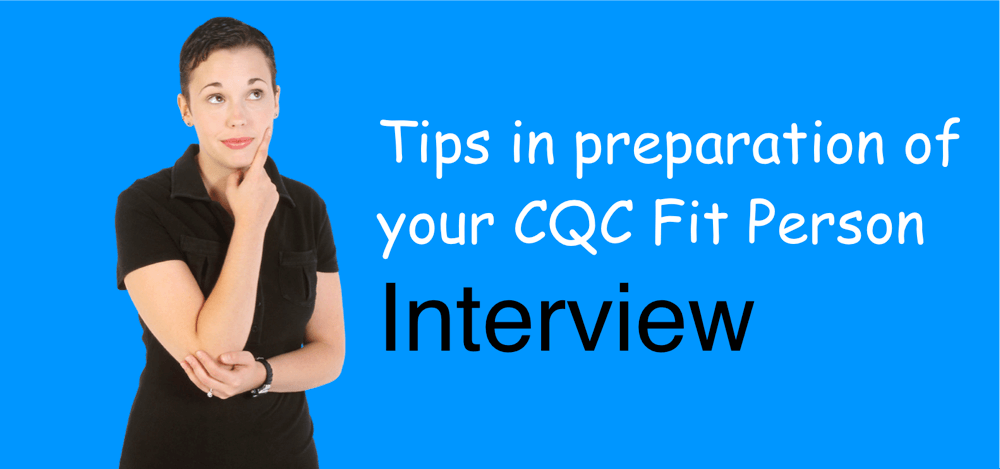CQC Fit Person Interview Tips

We have provided some tips in preparation for your CQC Fit Person interview. You need to be professional and respectful during your interview. It is normal to have a clash of personalities. This does not however excuse any negative bahaviour that can influence the outcome of the interview.
CQC inspectors are trained to be impartial, professional and to restrain their powers. They have rules, codes of practice and are strutinised by their managers. They will try to be professional and impartial and will use evidence to back up their reports. Where you seriously believe you have been discriminated then you need to access their complaints procedures after the interview. It is not true they behave with impunity. They are accountable and can be challenged correctly using the procedures in place including litigation.
False information
Do not lie or omit critical information in particular when it comes to your employment history or qualifications. If this were to happen it will be difficult to demonstrate how you will have integrity and be regarded as a fit person to run a safe, effective, successful care business.
Delivering regulated services
Do not be overzealous with your marketing. For example advertising regulated services when you are not yet registered. Your CQC inspector will research your organisation including browsing your website and checking company records as part of their registration. Regulated services should not be provided under any circumstances when you are not yet registered. This is illegal and the CQC can prosecute you.
Honesty
If you have had any issues with registration before this will need to be declared. Do not allow the CQC to find this information first as you will have difficulties explaining the omission.
You are entitled to put in a fresh application. You however need to ensure this time around you have addressed all concerns highlighted previously. Ensure that any new evidence does not contract any past information.
If putting a fresh application, we encourage you to be patient and not hurry things. It will not be wise to put in a new application soon after a refusal especially when there were fundamental issues highlighted. For example when refusal was due to concerns about the nominated individual and registered manager. Unless, these individuals have changed it will be a good idea to wait and regroup. It might not be plausible to get back to the CQC with fresh evidence of training that would have taken a day when there were concerns about safeguarding, medication and oversight of the organisation. That is just too risky for them to view as significant.
Ownership and Responsibility
Take ownership and responsibility of the evidence submitted to the CQC. Do not rely one hundred percent with on others and the so-called experts. Double check applications and the evidence you provide to the CQC. It has been known for certain discrepancies to appear when consultants have copy and pasted information from one client to another. At the end of the day you are responsible for your application.
Be Ready
Another tip is to only engage the CQC when you are ready and prepared. Do not take registration for granted. This can be quick and fast which will catch you off guard when not prepared. The consequences of a failed registration can have a baring on future applications as you might be asked to explain some aspects of your history.
Inspector Questions
When being asked questions by the inspector always think about the purpose of the question by making links to the fundamental standards and legislation. Your CQC will not ask you questions without a purpose.
When you are being asked to clarify the same question or it is asked from another angle that could be a hint your first response was not satisfactory of in-depth. Decisions by the CQC are always based on evidence. They will need to prove that you were consistent with your reasoning and response. Giving an unsatisfactory response several times is not good. This might demonstrate limited knowledge and understanding
Imagine a pilot of one of those big airlines. They are unlikely to own the plane but will know almost everything about the vehicle and the service such as destinations. They will have an oversight about the maintenance of the vehicle, staff, the service and meeting the needs of passengers. Now if you were a CQC inspector and you ask the pilot about basic maintenance, amount of fuel, how many staff will be on shift, how you will respond in an emergency and the response you get is only one-word answers or “I do not know”. Will you consider this pilot safe? Remember, all CQC inspectors work with a minimum assessment criteria based on risk- rating. They have a duty of care with their work also up to scrutiny. I suspect it takes more effort denying registration then getting you on the register. This is one time l will encourage you to have the so called “gift of the gab”. Answer with confidence, giving realistic examples to demonstrate your depth of knowledge and understanding.
During the interview do not be afraid of the inspector. Your Fit person Interview is not an exam. Feel free to ask the inspector to repeat the question if you did not get it the first time around. I have seen reports when a question about the complaints procedure in place was met with a response about safeguarding.
There should be a balance between seeking clarification and expectations. It will be detrimental if you end up asking about basic things you should know in the first place such as what person centered care is and the principles of the Mental Capacity Act 2005.

